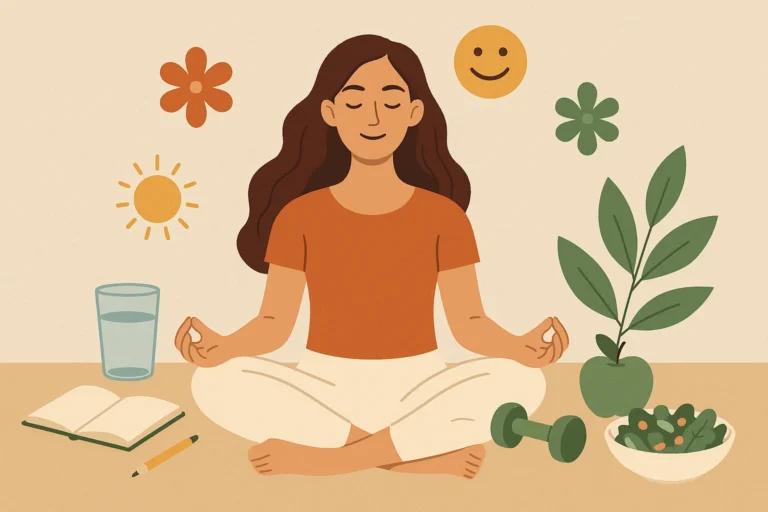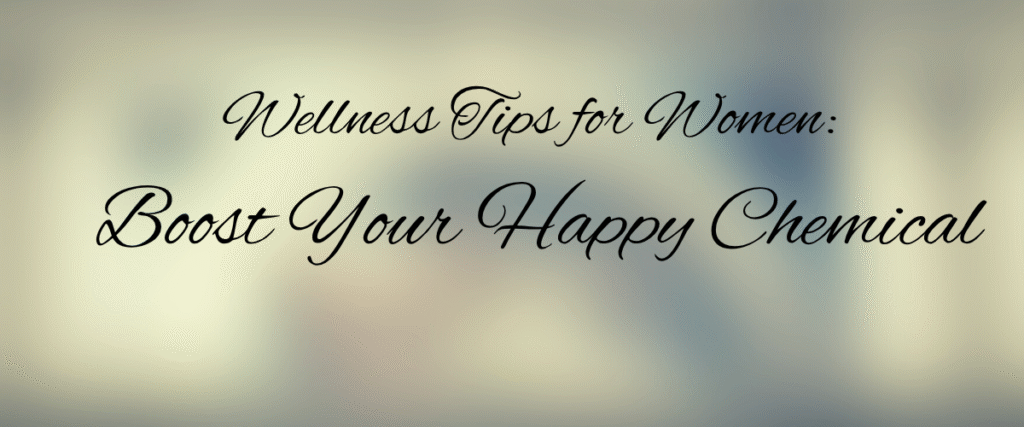Introduction: The Problem and the Solution
Many women today feel overwhelmed by daily stress, low energy, or persistent anxiety without knowing the biological causes behind these feelings. One hidden factor? Imbalanced “happy chemicals” — serotonin, dopamine, oxytocin, and endorphins. But here’s the good news: small wellness changes can naturally trigger these feel-good chemicals and transform mental and emotional health.
So how can women tap into their own brain chemistry to feel more joyful and balanced?
This article answers that question with evidence-based, practical wellness tips tailored for women — all rooted in science and easily applicable to your routine.
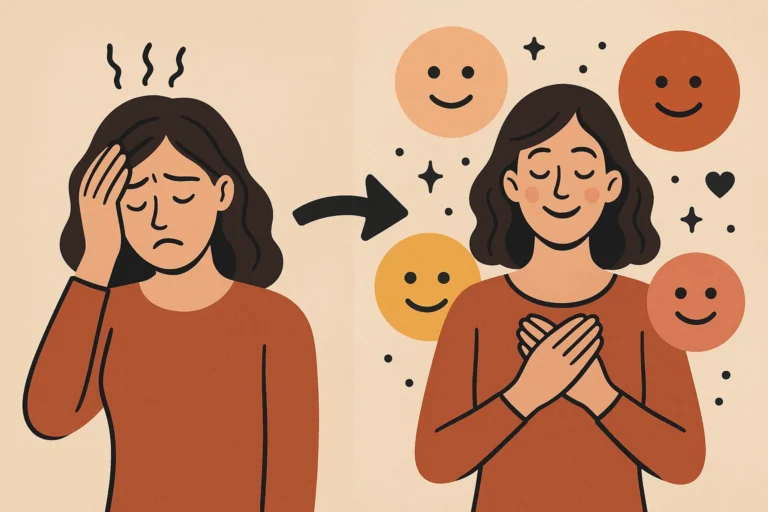
What Are Happy Chemicals and Why Women Need Them
Happy chemicals are neurotransmitters—chemical messengers in the brain—that influence how we feel, think, and behave. The four main ones are:
- Serotonin: mood stabilizer, controls well-being and happiness.
- Dopamine: motivation and reward, associated with pleasure.
- Oxytocin: bonding and connection, often called the “love hormone.”
- Endorphins: natural pain relievers, released during exercise or laughter.
Why Women Are More Affected
Studies show that hormonal changes during menstruation, pregnancy, and menopause can directly impact these chemicals (Harvard Health). Additionally, social expectations and multitasking roles increase cortisol levels — reducing feel-good neurotransmitters if left unbalanced.
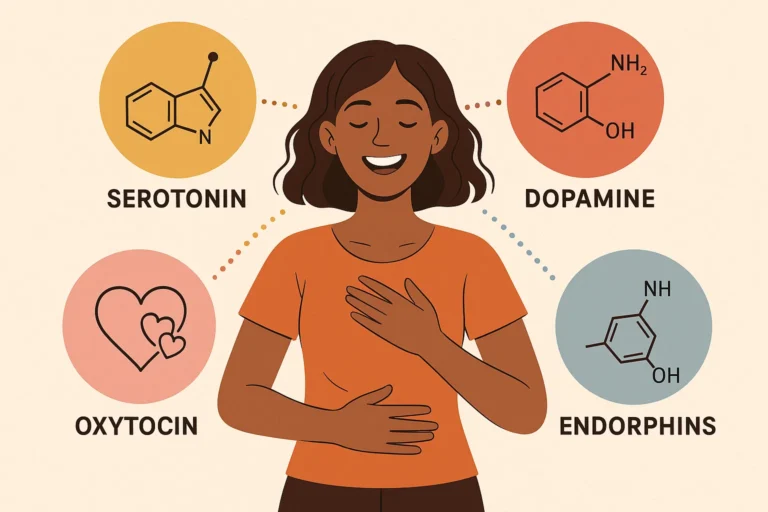
Daily Habits to Trigger Serotonin, Dopamine, Oxytocin, and Endorphins
Building a wellness lifestyle that stimulates these chemicals doesn’t require drastic change. Just 10–30 minutes of focused habits daily can increase happiness levels.
Morning Sunlight & Nature Walks (Serotonin)
Exposure to early sunlight helps the body produce serotonin and regulates circadian rhythms. Nature therapy or “forest bathing” has been linked to reduced depression and stress levels.
🧠 According to a 2021 study in Frontiers in Psychology, even 20 minutes in nature significantly improved mood and lowered cortisol.
Mini Celebrations & Gratitude Journaling (Dopamine)
Creating small goals and celebrating progress—like finishing a task or cooking a new recipe—boosts dopamine. Gratitude journaling also increases neural sensitivity to rewards.

Hugs, Pet Time, or Talking to a Friend (Oxytocin)
Acts of connection such as physical affection or bonding activities release oxytocin. Women who engage in regular social contact report higher satisfaction and lower anxiety.
Laughter, Dance, or a Quick HIIT Workout (Endorphins)
Endorphins are released through intense movement or laughter. A 15-minute cardio session or dance break is more effective than a cup of coffee for boosting energy naturally.
Nutrition and Fitness Tips to Support Hormonal Balance
The link between what we eat and how we feel is stronger than ever. Certain foods directly promote the production of neurotransmitters, while others suppress it.
Brain-Boosting Foods
- Tryptophan-rich foods (like turkey, eggs, and tofu) boost serotonin.
- Omega-3 fatty acids (found in salmon, walnuts, flaxseed) support dopamine.
- Fermented foods like yogurt and kimchi help gut health, indirectly increasing serotonin via the gut-brain axis.
Did you know? About 90% of serotonin is produced in the gut, not the brain (Cleveland Clinic, 2023).
Fitness for Hormonal Balance
- Strength training 2–3x per week enhances dopamine and regulates estrogen.
- Yoga and stretching reduce cortisol while improving mindfulness and oxytocin levels.
- Walking or jogging improves serotonin and endorphins simultaneously.
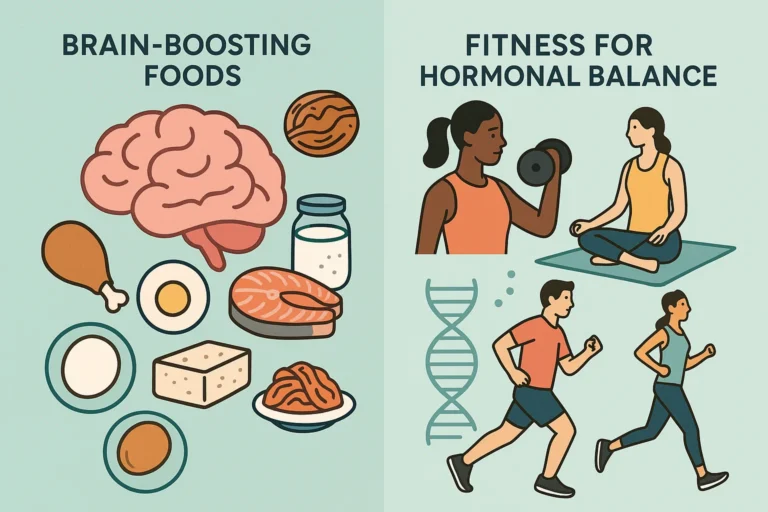
Mental Health and Emotional Wellness Practices That Work
Mental wellness is as important as physical health. In fact, emotional regulation influences the brain’s reward system just as strongly as food or exercise.
Mindfulness & Meditation
Regular meditation increases dopamine production and strengthens the prefrontal cortex — the part of the brain that controls emotions and decision-making.
Journaling Your Emotions
A 2022 UCLA study found that labeling your emotions in writing reduces amygdala activity (linked to stress and fear) and enhances mood clarity.
Aromatherapy & Calming Rituals
Essential oils like lavender and citrus increase endorphins and calm the nervous system. Lighting a scented candle before bed can support sleep and emotional regulation.
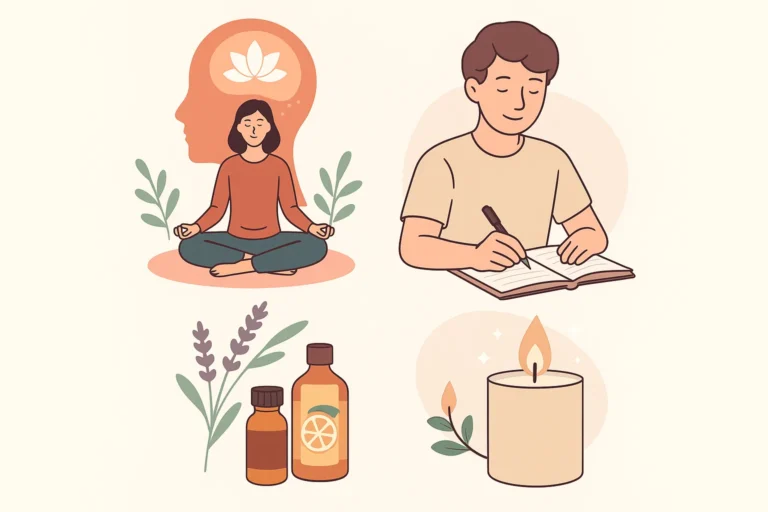
Holistic Self-Care Routines Backed by Research
Women’s wellness improves when multiple areas—physical, emotional, spiritual—are aligned. A holistic routine respects the full spectrum of well-being.
Build a Weekly Self-Care Ritual
- Sunday reset with meal prep and intention setting
- Midweek digital detox to reduce dopamine fatigue
- Friday facial or spa night for oxytocin and relaxation
Tech-Free Mornings or Evenings
Limiting blue light and notifications improves natural dopamine production and supports sleep cycles, which in turn help regulate happy chemicals.
Creative Hobbies & Acts of Service
Knitting, painting, cooking, or volunteering not only reduce stress but stimulate oxytocin and serotonin through flow state and purpose.
📊 According to Mental Health America, people who volunteer weekly are 33% more likely to report being “very happy.”
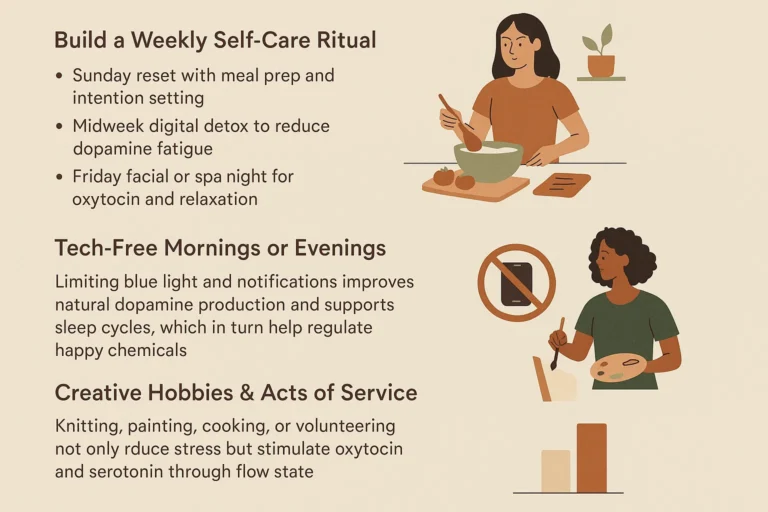
Conclusion: Real Wellness Starts Within
True well-being for women isn’t about chasing perfection — it’s about knowing how to nourish your inner chemistry. From tweaking your routine to enhancing your nutrition and mindset, you have the power to influence your happiness hormones every day. These wellness tips for women aren’t just good advice—they’re backed by neuroscience, psychology, and real-time results.
